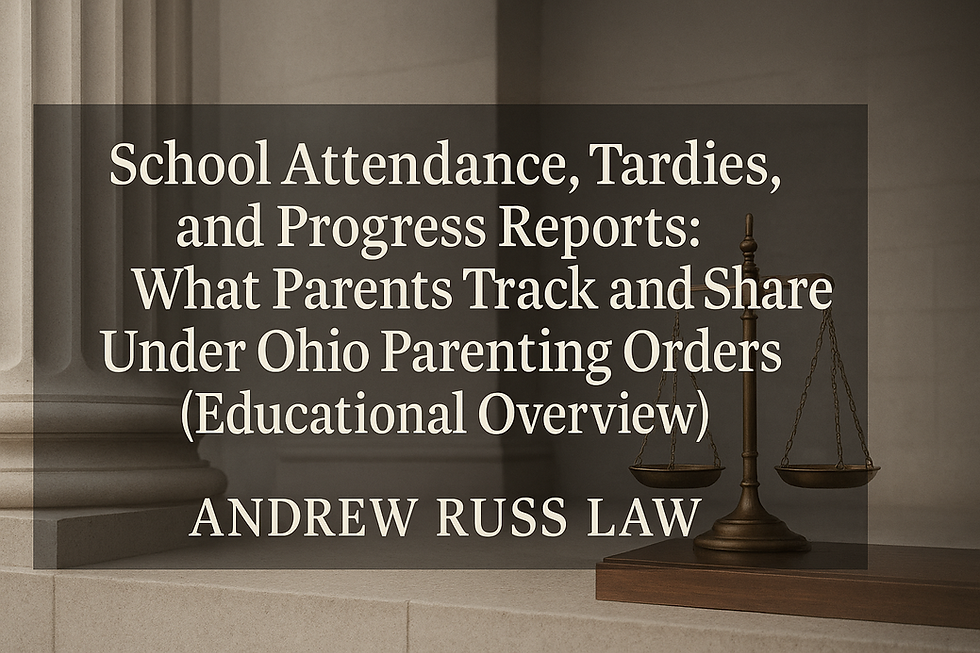School Attendance, Tardies, and Progress Reports: What Parents Track and Share Under Ohio Parenting Orders By Andrew Russ, Ohio Father’s Rights Attorney
- Oct 30, 2025
- 5 min read
By Andrew Russ, Ohio Father’s Rights Attorney
A plain-English overview of what Ohio parents often track and share—attendance, tardies, progress reports—and neutral ways to organize school info.

Disclaimer:
This article is for educational purposes only. It is not legal advice and does not create an attorney-client relationship.

What Parents Commonly Track & Share
· Attendance data: daily presence/absence, excused vs. unexcused, tardies, early dismissals
· School communications: teacher emails, portal notices, behavior/achievement notes
· Progress information: grade reports, missing work lists, IEP/504 updates
· Documentation tools: school portal screenshots, calendar entries, simple logs, file naming
conventions
· Neutral exchange methods: shared folders, brief confirmations, monthly roundups
Why this matters (and how to keep it neutral)
School records show a child’s day-to-day experience—showing patterns (missed Mondays, late arrivals after exchanges, or steady improvement with new routines). Parents often find that organized, neutral sharing reduces conflict and keeps everyone focused on the child’s needs.This guide offers practical, non-advisory ideas for gathering and sharing school-related information in ways many families find workable.

What schools typically track (and where to find it)
· Daily attendance: present/absent; excused vs. unexcused categories
· Tardies & early dismissals: timestamps or “periods missed”
· Grades & progress: current averages, missing/late work, rubric feedback
· Teacher notes: comments on participation, behavior, or classwork
· Assessments: benchmark tests, unit exams, standardized score snapshots
· Supports: IEP/504 plans, intervention notes, service logs (where applicable)
Common sources:
· Your district’s parent portal (Infinite Campus, PowerSchool, ProgressBook, etc.)
· Email from teachers/counselors/administration
· Printed notices (progress reports, warning letters)
· Classroom apps (e.g., Google Classroom gradebook views or missing-work lists)
What parents often track (without legalese)
· Absences & reasons (illness, appointment, travel)
· Tardy patterns (how often, how late, day of the week)
· Grade trends (unit to unit; missing work closed out; late-work policies)
· Attendance-impacting logistics (bus issues, exchange timing, morning routines)
· Support action items (practice logs, tutoring sessions, reading minutes)
· Communication history (date/sender/summary of key teacher emails)
Neutral ways to share school information
· A shared “School” folder (cloud drive or co-parenting app) with clear subfolders and file names
· Weekly or monthly roundup: one message with bullet points and links to files
· Brief confirmations for key items (e.g., “Uploaded Q1 progress report to the shared folder.”)
· A simple “exceptions” workflow for out-of-the-ordinary items (new intervention plan,
counselor note)
A lightweight documentation toolkit (pick what helps)
· Portal screenshots for attendance or missing-work lists
· Calendar entries for tests, conferences, due dates, and makeup sessions
· A one-page monthly log noting date, item, and brief outcome
· Email PDFs for consistent archiving
· A quarterly summary page with key metrics (absences/tardies, GPA/grade buckets, notes)
Privacy tip: Redact unrelated student names if you screenshot class lists or group messages.
Attendance & tardies
· Day-of-week trends (e.g., spikes on exchange days or Mondays)
· Event-linked changes (e.g., improvement after a new routine)
· Excused vs. unexcused consistency (notes/doctor’s letters on file)
· Transition friction (morning hand-offs affecting arrival times)
Progress reports & missing work: organizing the flow
· Quarterly cadence: save each report with quarter labels
· Missing work: screenshot/export lists and note due dates and policies
· Skill snapshots: flag rubric lines showing growth or areas to watch
· Action items: concise bullets (e.g., “Two missing assignments; student plans to attend Tuesday
study hall.”)
· IEP/504 context (when applicable): track meeting dates, accommodation summaries, and
follow-ups

Teacher communications: child-focused
Many parents find that brief, respectful messages get the fastest, clearest responses. Keep subject lines clear, bodies short (4 lines), and share a copy in the co-parent folder if it affects schedules or support plans.
· “Uploading Ms. Lopez’s note about the reading intervention schedule.”
· “Attached: math missing-work screenshot with due dates.”
A year-round cadence that tends to work
· Weekly: attendance & missing-work glance; calendar items
· Monthly: one-page summary; month’s folder
· Quarterly: progress report + pros/cons
· As-needed: exceptions (nurse visits, counseling updates, service logs)
Make it easy to find things later (naming & structure)
Folders: School → {Attendance | Progress | Teacher Emails | IEP-504 | Monthly Summaries | Exceptions}File names: YYYY-MM-DD_Type_Subject.ext (e.g., 2025-10-20_Email_MathTeacher.pdf)Roundups: Keep a running doc: 2025-10_Roundup.md with bullets and links
Related educational reads on my Blog:
• School Choice & Extracurricular Conflicts in Ohio Parenting Orders (educational overview)• Contempt vs. Modification, Part II: Evidence That Moves the Needle (non-advisory evidence organization guide)
Wrap-up
Attendance, tardies, and progress reports become manageable when you choose one place to save files, one naming scheme, and a steady sharing cadence. The simpler and more consistent your routine, the easier it is for everyone to stay aligned on what matters most—your child’s school year.

How Andrew Russ Advocates for Ohio Fathers
· Clear strategy from day one: We map the custody/visitation path that fits your goals and facts.
· Focused evidence development: We identify the proof that matters—and cut what doesn’t.
· Negotiation + litigation readiness: Many cases resolve with strong parenting plans; we’re
prepared to try your case when necessary.
· Local insight: Familiarity with Ohio courts and procedures helps us move efficiently and
effectively.
Call Now:
Ready to take the next step? Schedule a strategy session with Andrew Russ, Ohio Family Law Attorney. Call (614) 907-1296 or complete our quick online consultation form to get started. Evening and virtual appointments available.

Legal Sources on Parenting Issues:
Ohio allocation of parental rights & shared parenting (R.C. 3109.04). (Ohio Laws)
Parenting time statute and scheduling (R.C. 3109.051). (Ohio Laws)
Presumptions and establishment of paternity (R.C. 3111.03). (Ohio Laws)
Paternity acknowledgment routes (Ohio Centralized Paternity Registry). (ODJFS)
Child support worksheet and definitions (R.C. 3119.022; 3119.01). (Ohio Laws)
andrewrusslaw.com Blog:
Disclaimer: This article provides general information and is not legal advice. Legal outcomes vary by facts and jurisdiction. Consult an attorney about your specific situation.
LINKS:
Disclaimer: The blog and articles provide general educational information, are not legal advice, and do not create an attorney/client relationship. Legal outcomes vary by facts and jurisdiction. Consult an attorney about your specific situation.
© Andrew Russ Law, LLC • Educational content only • Columbus & Athens, Ohio



